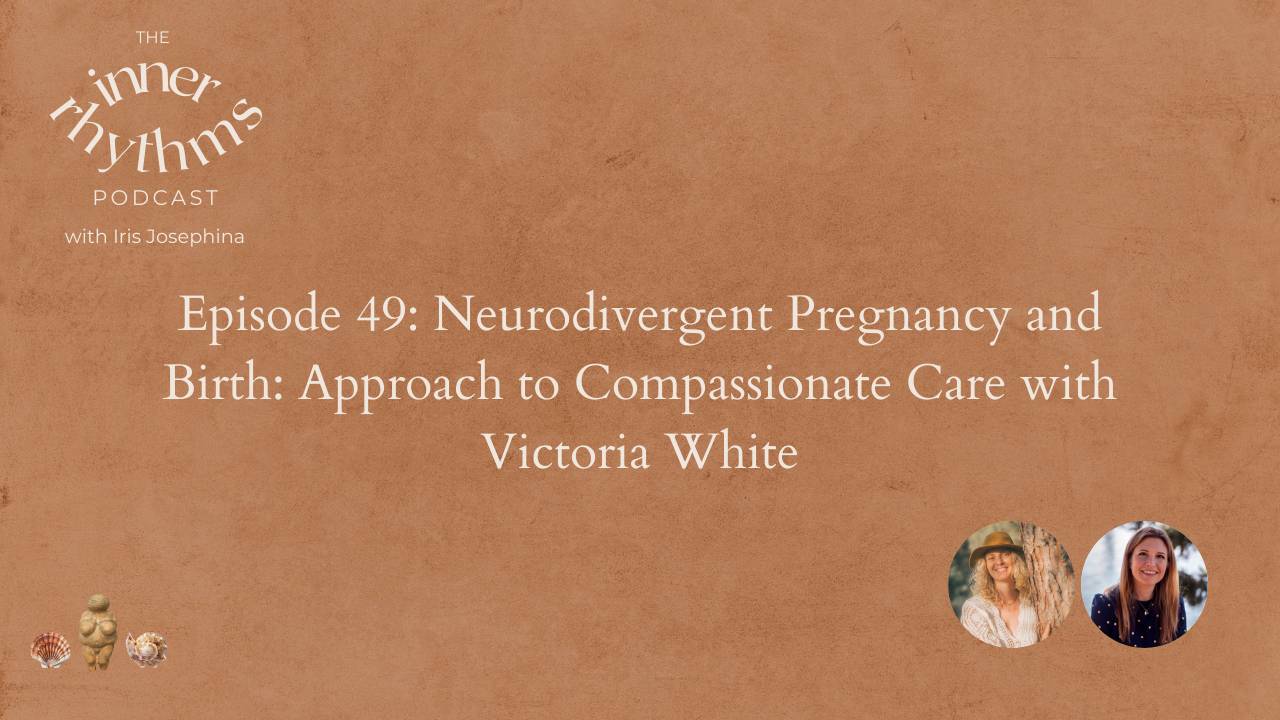Episode 49: Neurodivergent Pregnancy and Birth: Approach to Compassionate Care with Victoria White

As a neurodivergent person on my preconception journey, I've found myself wondering what pregnancy, birth, and postpartum might look like through a neurodivergent lens. During my research, I was fortunate to discover Victoria White and her social enterprise Neurodivergent Birth, which provides much-needed resources for neurodivergent individuals navigating the perinatal journey.
In this enlightening conversation, Victoria shares her insights as a birth and postnatal doula who supports families through pregnancy, birth, and beyond. She's also a trained traumatic birth recovery practitioner, perinatal emotional health and wellbeing practitioner, and mother of two girls, one of whom is autistic. Her passion for improving support for neurodivergent people perinatally stems from both personal and professional experience.
By tuning in, you'll learn:
- Victoria’s background and how they became interested in birth work.
- The journey to specializing in neurodivergent pregnancy, birth, and postpartum care.
- Key differences between neurodivergent prenatal care and neurotypical care.
- Victoria’s vision for changes in birth care.
- Recommendations for neurodivergent individuals preparing for pregnancy.
- Discussion of preconception experiences and neurodivergent perspectives.
- Final wisdom for neurodivergent people who wish to have a baby.
Topics Covered
In this informative discussion with Victoria White, we explore:
- The unique challenges neurodivergent individuals face during pregnancy, birth, and postpartum
- How sensory processing differences impact the perinatal experience
- The effects of masking and anxiety on neurodivergent birthing people
- Practical strategies for planning and preparation that reduce overwhelm
- The importance of individualized, neurodivergence-aware perinatal care
- How neurodivergent traits can become strengths in parenthood
- Resources and support available through Neurodivergent Birth
- Advocacy tips for neurodivergent individuals in medical settings
About Victoria White
Victoria White is a birth and postnatal doula based in Aberdeen, Scotland, who supports families through pregnancy, birth, and beyond. She believes birthing people have the right to a positive birth and postnatal experience, which can be achieved with consistent and compassionate support.
She offers support both in person in Aberdeen and online anywhere in the world. Victoria is also a trained traumatic birth recovery practitioner and perinatal emotional health and wellbeing practitioner.
Connect with Victoria
- Website: www.ndbirth.com
- Instagram: https://www.instagram.com/neurodivergentbirth/
Listen to the Episode
Timestamps
[00:00:00] ADHD diagnosis and concerns about pregnancy as neurodivergent
[00:00:53] Finding "Neurodivergent Birth" social enterprise
[00:01:42] Victoria's work as birth doula supporting families
[00:02:11] Podcast overview on menstrual cycles and body wisdom
[00:03:15] Iris's ADHD diagnosis and preconception journey
[00:03:51] Career transition from marine biology to birth work
[00:06:28] Daughter's diagnosis inspiring specialized focus
[00:07:38] Standard maternity care fails neurodivergent needs
[00:10:22] Sensory challenges during pregnancy and birth
[00:12:28] Masking burden during perinatal period
[00:15:31] Specialized antenatal education for neurodivergent families
[00:17:23] Advice for neurodivergent pregnancy planning
[00:20:06] Detailed preconception planning despite criticism
[00:23:19] Different experience of body sensations during pregnancy
[00:24:40] Benefits of preconception planning and birth space visits
[00:27:04] Celebrating neurodivergent strengths in parenting
[00:30:35] Information about workshops and resources
Victoria's Journey to Birth Work
Victoria shares that her path to birth work began after having her own children and experiencing challenges during birth and postpartum:
"I had quite a difficult, challenging time having them and postnatally as well. And it really sort of led me to be very interested in maternal mental health and supporting people who are navigating the whole perinatal journey."
After initially training as a breastfeeding supporter, Victoria's family moved to France, which gave her the opportunity to reconsider her career path. She trained as a doula and began supporting members of the English-speaking expat community in Paris, many of whom were navigating pregnancy and birth away from their support systems and in a different language.
Upon returning to Scotland, Victoria continued her birth work while also embarking on a new journey: supporting neurodivergent perinatal experiences.
The Neurodivergent Birth Focus
Victoria's focus on neurodivergent birth experiences was inspired by her daughter's autism and ADHD diagnosis, which prompted her to immerse herself in learning about neurodivergence:
"I really began to look at my own experiences in childhood with a different lens because I really feel that my daughter is very much navigating a lot of the things that I had to navigate as a child, but perhaps without the same understanding and support behind it."
While deepening her understanding of neurodiversity, Victoria realized there was a significant gap in conversations about neurodivergent perinatal journeys:
"We're not talking about what it is like to navigate the perinatal journey as a neurodivergent person. And there are differences, there are areas of challenge, but there are areas of positivity and joy as well.”
How Neurodivergence Impacts the Perinatal Journey
Victoria highlights several key areas where neurodivergent individuals may experience pregnancy, birth, and postpartum differently:
Sensory Processing
"The senses and how our senses are just bombarded with information every second of the day when we're navigating pregnancy and birth. It's a hugely sensory experience. There's a lot of information coming our way. The way we feel within our bodies also changes the way we experience our senses changes. It's a real time of heightened sensory sensitivity."
For neurodivergent people who may be hypersensitive (very reactive) or hyposensitive (under reactive) to certain stimuli, this can present unique challenges:
- Medical appointments in noisy environments with bright lighting
- Sharing ward space with other people, babies, and visitors
- Experiencing birth sensations and pain differently
- Managing the sensory output of caring for a newborn
Communication Styles
Neurodivergent individuals often have different communication styles, which can affect interactions with healthcare providers and understanding of medical information.
Executive Functioning
Tasks related to pregnancy and new parenthood can be challenging for those with executive functioning differences:
"Our ability to kind of analyze a task needs doing right through to completing that task in a timely manner. We can have some issues with focus, with prioritizing, with organization and time management."
Anxiety and Masking
Many neurodivergent people navigate life with underlying anxiety, which can be exacerbated during pregnancy:
"Many people who are neurodivergent are navigating life on a foundation of anxiety. It is difficult to function in a world that is very much set up to meet neurotypical needs."
For female neurodivergent individuals especially, masking (hiding neurodivergent traits to appear more neurotypical) can be exhausting:
"Females are particularly socially motivated and very, very good at masking as a result of that. And when it comes to pregnancy and birth and even to being a parent, there is a kind of social construct of what you should be doing."
Creating a New Paradigm for Neurodivergent Perinatal Care
Victoria advocates for greater awareness among health professionals about how neurodivergence may impact the perinatal journey:
"I would love to see more awareness from the health professionals, from the birthing professionals about the ways that neurodivergence may impact the perinatal journey. And then we can ask a person what their support needs might be around some of these key themes."
This awareness could lead to:
- Modified environments that account for sensory needs
- Adjusted communication styles
- Better recognition of meltdowns and shutdowns
- Greater understanding of informed consent in neurodivergent individuals
Victoria's social enterprise, Neurodivergent Birth, is developing antenatal education specifically for neurodivergent birthers and their families to address these gaps.
Advice for Neurodivergent People Planning Pregnancy
For neurodivergent individuals considering pregnancy, Victoria offers several practical recommendations:
Acknowledge the Uncertainty
"The whole perinatal period, right from trying to conceive can be stressful. For everybody, but particularly if you're a neurodivergent person who really needs normally to have a sense of what's happening, a sense of control, perhaps a routine."
Show yourself self-compassion about finding uncertainty challenging, and consider seeking support to navigate it.
Become Informed
"There are a lot of choices and decisions to make along your perinatal journey. And often we're surprised at the things that are not default within our healthcare setting."
Research the physiology of pregnancy and birth, as well as the different medical interventions that might be offered:
"Consent is not really true consent unless it's informed."
Activate Your Parasympathetic Nervous System
Find ways to activate your "rest and digest" nervous system through activities like yoga, relaxation techniques, or cold water swimming.
Plan Ahead
As discussed during our conversation, planning ahead can be incredibly helpful for neurodivergent individuals. I shared my own experience of making lists for labor, birth, and postpartum during the preconception phase:
"I already have lists for things that I need during birth, during labor, postpartum, like I have prepared everything. So it's out of my brain. And I don't have to think about it. And basically I can get pregnant and I know everything is there on a list in a drawer, and it doesn't have to sit in my brain because I've thought about it and I can just be with my pregnancy."
Victoria validates this approach, noting that it should be normalized rather than judged:
"Particularly for the neurodivergent brain, anything we can do to help sort of get some of these things down on paper and away from the kind of chaos that can sometimes be going on in our minds. And that brings real reassurance."
Visit Birth Spaces in Advance
If possible, visit potential birth locations ahead of time to assess sensory challenges and request necessary adjustments.
Test Products Beforehand
Try out items like nursing bras to identify any sensory issues and find comfortable alternatives.
Celebrating Neurodivergent Parenthood
Victoria emphasizes that neurodivergent individuals often make wonderful parents, bringing unique strengths to the role:
"So many neurodivergent people are just such wonderful parents because, I generally find that there is this real desire to parent and to do it well, and there's a lot of hyper focus on the topics."
The research, care, and attention that neurodivergent people put into things they care about can be tremendous assets in parenthood:
"For example, if you then go to see a health professional with a breastfeeding question and you realize that you actually know much more yourself than a health professional on the topic."
Key Takeaways
- Sensory considerations are crucial - Pregnancy and birth are highly sensory experiences, and neurodivergent individuals may need accommodations for sensory processing differences
- Planning reduces anxiety - Creating lists, visiting birth spaces in advance, and testing products beforehand can help manage uncertainty
- Self-advocacy matters - Communicating your needs clearly or having someone advocate for you ensures better care
- Informed consent is essential - Researching options thoroughly helps neurodivergent individuals make decisions that align with their needs
- Regular nervous system regulation - Finding ways to activate the parasympathetic nervous system helps manage anxiety throughout the journey
- Neurodivergent strengths are assets - Hyper-focus, attention to detail, and thorough research abilities can be tremendous strengths in parenthood
- Community support is valuable - Finding support from those who understand neurodivergent experiences can reduce isolation
- You are enough - Your neurodivergent experience matters and brings unique perspectives to parenthood
Adele reminds us that while both ADHD and hormonal fluctuations present challenges, understanding their intersection empowers us to create lives that work with our unique neurological makeup rather than against it.
About the Host
I’m Iris Josephina—functional hormone specialist, orthomolecular hormone coach, and entrepreneur. Through Cycle Seeds and The Inner Rhythms Podcast, I support people in reconnecting with their cyclical nature, deepening body literacy, and reclaiming hormonal harmony from a place of sovereignty and embodied knowledge. Most people know me from Instagram, where I share stories, tools, and inspiration on cyclical living, menstrual cycles, fertility, hormones and more.
Let’s stay connected:
💻 Visit the Cycle Seeds website



